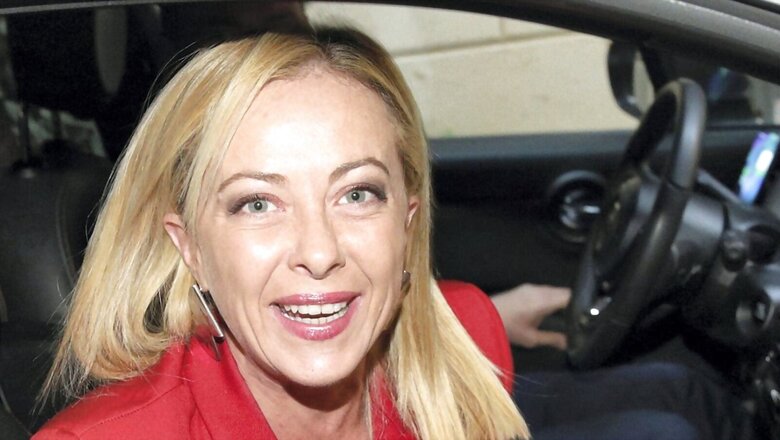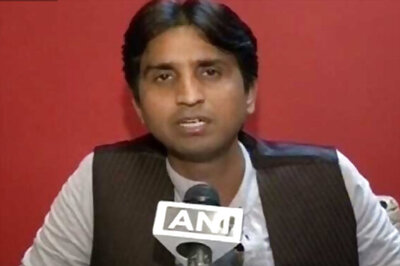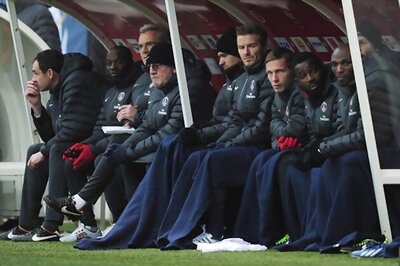
views
Italy is changing. And this could be a landmark moment for Europe. A Right-wing coalition led by Giorgia Meloni’s Brothers of Italy party has emerged victorious in the country’s general election. This is the first time that the far-Right came to power in Italy since World War II.
Yet, what just happened in Italy could change the political landscape in the whole of Europe. Europe could be headed for a major political realignment that could touch upon issues like anti-semitism, fundamentalism, the relevance of the EU and mass migration into the continent.
Meloni’s hard stance on migration
Immigration into Europe has been a contentious political issue for quite some time now. European leaders like former German Chancellor Angela Merkel were seen rooting for a lax migration policy.
As such, Italy is located on the crossroads of Africa and Asia, explaining its close proximity to the Middle East and North Africa region. For the past few years, undocumented migrants have been crossing the Mediterranean Sea to enter Italy and other parts of the world. While other European nations too had to handle the burden of migrants, Italy has been at the forefront of the crisis due to its geographical position.
As of 2018, there were an estimated 500,000 undocumented migrants living in Italy. From the perspective of the Italian Right-wing, such mass migration is the cause of social instability. Southern parts of Italy are being overwhelmed by immigration into the Mediterranean country, which has snowballed into a major political issue.
Meloni is, in fact, coming to power with a promise to control rampant immigration into Italy. During her poll campaign, she clearly said that she wants the Italian Navy to turn away migrant boats before they arrive on the Italian coast.
This is likely to emerge as a sticking issue between the EU and a Meloni-led Italy on the subject of migrant policy.
Anti-semitism and fundamentalism
The Jewish nation of Israel has had its reservations with the far-Right in Europe, especially in Germany and Italy. Given the history of the Holocaust that the Jews had to face, Israel has been more or less boycotting European far-Right leaders.
However, Meloni could change all of this. She has already tried to befriend Israel but in a way that would cause unease in the liberal circles controlling the EU.
Meloni has condemned anti-semitism and hate comments that Jews have to face in Europe. Apparently, she blames the far-Left and Islamic fundamentalism for this trend. She even said, “I think that one of the most common manifestations of anti-semitism today is anti-Israel propaganda, which Jews in Europe are most likely to encounter online. Jews in Europe are also subjected to the threat coming not only from far-Left and far-Right factions, but especially from radicalised Islamic immigrants who feed on resentment with regards to Israel.”
She had added, “Israel is and ought to continue to be a crucial ally of the European Union in the endeavour to eradicate this evil worldwide. We support efforts to increase young students’ understanding of Jewish history, religion, and culture. This will support the elimination of societal prejudices and the full acceptance of Jewish customs in Europe.”
The European Left-liberals would perhaps be in agreement with Meloni on the subject of immigration. But they are most likely in conflict with Meloni’s version of blaming fundamentalism for growing anti-semitism. The idea of a liberal, integrated Europe has been to ignore contentious issues like fundamentalism and the consequences of uncontrolled migration. Now, when the third-largest economy in the EU starts raising such issues, there will be a sense of bitter disagreement within the regional bloc.
Shifting balance of power inside EU
The EU has maintained its liberal side till date because it has been led by three power centres- Brussels, Berlin, and Paris. However, the right-wing is already rising in Europe. Italy is set to get a far-right government. Hungary already has a nationalist Prime Minister in Viktor Orban, Marie Le Pen has been garnering greater support in France and Poland has been the face of right-wing ideology in Europe for quite some time.
So, we see a shift in balance of power. Recently, Meloni’s MEPs voted against a resolution that sought to condemn Hungary as “a hybrid regime of electoral autocracy”. Meloni also maintains close contacts with Poland’s ruling nationalist Law and Justice party, the anti-immigrant Sweden Democrats and Spain’s far-right Vox party.
In fact, Meloni seems to harbour larger ambitions for Europe and create a model for not only Italy, but also for Europe. Together, the resurgent Right-wing forces are looking to create a Europe that handles mass immigration, fights fundamentalism, breaks free from fiscal deficit restrictions imposed by the EU and protects traditional European values. In doing so, the Right-wing leaders in Europe are successfully tapping into the popular sentiment by exploring sheer frustration caused by inflationary pressures, mass immigration and growing number of radical attacks.
What the likes of Meloni and other Right-wing forces desire is at odds with how the liberal circles have led and modelled Europe till now. So, the rise of a far-Right could well be the moment of reckoning for Europe.
Akshay Narang is a columnist who writes on national and international affairs. The views expressed in this article are those of the author and do not represent the stand of this publication.
Read all the Latest Opinion News and Breaking News here



















Comments
0 comment